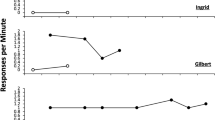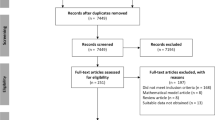Abstract
Two experiments investigated moment-to-moment interactions between collateral and operant behaviors. Rats’ lever pressing was reinforced with food on a variable-interval (VI) schedule. In Experiment 1, access to water was first freely available and then presented in 10-s probes at different times within the interreinforcement intervals on the VI schedule. With free access to water, drinking occurred immediately after food reinforcement and lever pressing was suppressed. Drinking occurred during probes and the extent of drinking and the degree of suppression of lever pressing depended upon the probe position within the VI schedule. In Experiment 2, access to wheel running was first presented in probes ranging from 2 to 128 s. Probes controlled a changeover to wheel running and caused a suppression in lever pressing. When wheel running was accessible most of the session time, periods of no access to running were scheduled as probes for 2 to 128 s. Cessation of wheel running during probes increased the momentary probability of lever pressing. In both experiments, restricted access to the collateral response resulted in an increase of the momentary probability of that response and a concomitant reduced probability of the operant response. The experiments demonstrate the feasibility of the probe technique in analyzing and controlling moment-to-moment patterns of collateral and operant behaviors.
Similar content being viewed by others
References
ALLEN, J. D., & PORTER, J. H. (1975). Demonstration of behavioral contrast with adjunctive drinking. Physiology and Behavior, 15, 511–515.
ALLEN, J. D., PORTER, J. H., & ARAZIE, R. (1975). Schedule-induced drinking as a function of percentage reinforcement. Journal of the Experimental Analysis of Behavior, 23, 223–232.
DANIEL, W., & KING, G. D. (1975). The consequences of restricted water accessibility on schedule-induced polydipsia. Bulletin of the Psychonomic Society, 5, 297–299.
Delprato, D. J. (in press). Response patterns. In H. W. Reese & L. J. Parrott (Eds.), Advances in behavior science. New York: Lawrence Erlbaum.
FLORY, R. K., & O’BOYLE, M. K. (1972). The effect of limited water availability on schedule-induced polydipsia. Physiology and Behavior, 8, 147–149.
GILBERT, R. M. (1974). Ubiquity of schedule-induced polydipsia. Journal of the Experimental Analysis of Behavior, 21, 277–284.
HENTON, W. W. (1981a). Concurrent classical conditioning. The Psychological Record, 31, 395–411.
HENTON, W. W. (1981b). Kupalov conditioning: Molecular control of response sequences. The Psychological Record, 31, 489–509.
HENTON, W. W., & IVERSEN, I. H. (1978). Classical conditioning and operant conditioning: A response pattern analysis. New York: Springer Verlag.
IVERSEN, I. H. (1976). Interactions between reinforced responses and collateral responses. The Psychological Record, 26, 399–413.
IVERSEN, I. H. (1984, May). The power of temporal contiguity in behavior change. Paper presented at the Association for Behavior Analysis, Nashville, TN.
IVERSEN, I. H. (1985). Response interactions in multiple schedules: Behavior contrast and response displacement. The Psychological Record, 35, 3, 401.
KEEHN, J. D., & MAYERS, A. (1979). Effect of constraint on schedule-induced drinking. Bulletin of the Psychonomic Society, 14, 112–114.
PORTER, J. H., & ALLEN, J. D. (1977). Schedule-induced polydipsia contrast in the rat. Animal Learning and Behavior, 5, 184–192.
PREMACK, D. (1965). Reinforcement theory. In D. LEVINE (Ed.), Nebraska Symposium on Motivation. Lincoln: University of Nebraska Press.
RAY, R. D., & BROWN, D. A. (1975). A systems approach to behavior. The Psychological Record, 25, 459–478.
RAY, R. D., & BROWN, D. A. (1976). The behavioral specificity of stimulation: A systems approach to procedural distinctions of classical and operant conditioning. Pavlovian Journal of Biological Science, 11, 3–23.
ROSELLINI, R. A. (1979). Schedule-induced polydipsia under conditions of restricted access to water. Physiology and Behavior, 22, 405–407.
Author information
Authors and Affiliations
Additional information
Preparation of the manuscript was supported by a grant from the Danish Research Council of the Humanities and by a research fellowship from the University of Copenhagen.
Rights and permissions
About this article
Cite this article
Iversen, I.H. Restricted Access to Collateral Behavior Affects Operant Behavior on Variable-Interval Schedules. Psychol Rec 35, 411–424 (1985). https://doi.org/10.1007/BF03395862
Published:
Issue Date:
DOI: https://doi.org/10.1007/BF03395862




